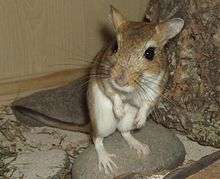Persian jird
| Persian jird | |
|---|---|
 | |
| Scientific classification | |
| Kingdom: | Animalia |
| Phylum: | Chordata |
| Class: | Mammalia |
| Order: | Rodentia |
| Family: | Muridae |
| Genus: | Meriones |
| Species: | M. persicus |
| Binomial name | |
| Meriones persicus (Blanford, 1875) | |
The Persian jird (Meriones persicus) is a species of rodent in the family Muridae found in Afghanistan, Armenia, Azerbaijan, Iran, Iraq, Pakistan, Turkey, and Turkmenistan.
The Persian jird is about 6 inches (15 cm) long and has a brush-tipped tail that is slightly longer than the body. They are brown with white bellies.
The Persian jird's natural habitats are dry rocky hillsides with little vegetation and semi-desert areas. They find shelter in either small burrows or under overhanging rocks. These jirds can also be found living near humans, such as under walls.
In the wild, Persian jirds eat dry plant material and grains, with small insects as a supplement.
Persian jirds usually have two litters a year, each with around seven pups
Some people keep this species as a pet. They can live to be six or seven years old. They need large cages that allow climbing and leaping.
References
- ↑ Molur, S. & Sozen, M. (2016). "Meriones persicus". The IUCN Red List of Threatened Species. IUCN. 2016: e.T13166A22433231. doi:10.2305/IUCN.UK.2016-2.RLTS.T13166A22433231.en. Retrieved 15 December 2017.
- Baillie, J. 1996. Meriones persicus. 2006 IUCN Red List of Threatened Species. Downloaded on 19 July 2007.
- Barker, Julian. (1998-12) The Persian Jird. The Nibbler (Journal of the National Gerbil Society).
- Musser, G.G.; Carleton, M.D. (2005). "Superfamily Muroidea". In Wilson, D.E.; Reeder, D.M. Mammal Species of the World: A Taxonomic and Geographic Reference (3rd ed.). Johns Hopkins University Press. pp. 894–1531. ISBN 978-0-8018-8221-0. OCLC 62265494.
